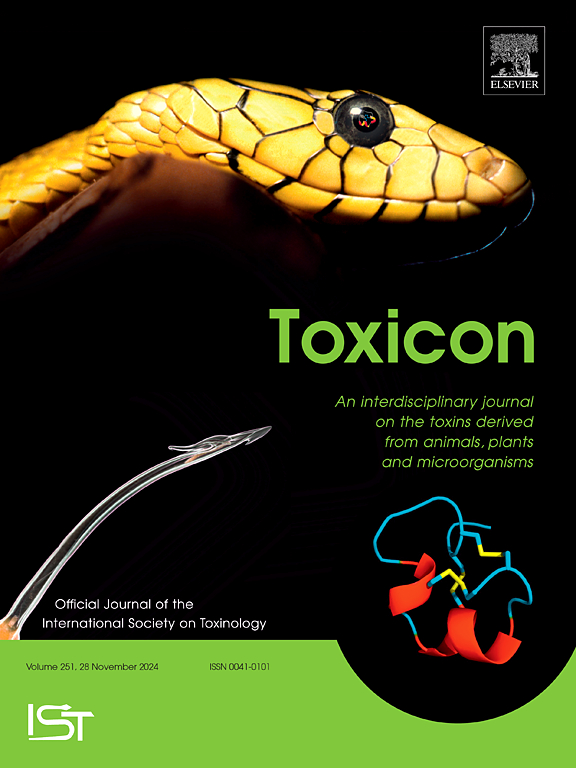针对巨噬细胞控制的肠粘膜愈合的营养调节:脱氧雪腐镰刀菌醇诱导的肠粘膜炎的一种有希望的策略
IF 2.6
4区 医学
Q2 PHARMACOLOGY & PHARMACY
引用次数: 0
摘要
脱氧雪腐镰刀菌醇(DON)是全球污染最严重的真菌毒素之一,通过环境途径污染农产品和食品,损害人类和动物肠道屏障的完整性和体内平衡。这种破坏会引发肠黏膜炎,并加剧炎症性肠病(IBD)的进展。目前专注于免疫抑制的治疗方法由于耐药而面临局限性,因此将研究转向持续缓解的粘膜愈合策略。巨噬细胞是肠道免疫的重要介质,其代谢和表型可塑性对粘膜修复至关重要。新出现的证据强调营养介导的代谢重编程是增强巨噬细胞驱动的粘膜愈合和屏障恢复的潜在途径。本文综述了don诱导的肠道毒性机制,讨论了巨噬细胞在肠粘膜愈合中的复杂功能,并重点介绍了以巨噬细胞为靶点的营养调节促进肠粘膜愈合的最新进展。最后,提出了通过创新营养策略减轻don相关健康风险的可行研究方向,重点强调了在食品安全和精准营养方面的转化应用。本文章由计算机程序翻译,如有差异,请以英文原文为准。
Nutrient regulation targeting macrophage-controlled intestinal mucosal healing: A promising strategy against intestinal mucositis induced by deoxynivalenol
Deoxynivalenol (DON), one of the most severely polluting mycotoxins globally, contaminates agricultural products and food through environmental pathways, compromising intestinal barrier integrity and homeostasis in humans and animals. This disruption triggers intestinal mucositis and exacerbates inflammatory bowel disease (IBD) progression. Current therapies focusing on immunosuppression face limitations due to drug resistance, shifting research toward mucosal healing strategies for sustained remission. Macrophages, essential mediators of intestinal immunity, exhibit metabolic and phenotypic plasticity critical for mucosal repair. Emerging evidence highlights nutrient-mediated metabolic reprogramming as a potential approach to enhance macrophage-driven mucosal healing and barrier restoration. This review synthesizes DON-induced intestinal toxicity mechanisms, discusses the complex functions of macrophages in intestinal mucosal healing, and highlights the current advances of nutrients regulation targeting macrophages to promote intestinal mucosal healing. Finally, feasible research directions for mitigating DON-related health risks through innovative nutritional strategies are proposed, emphasizing translational applications in food safety and precision nutrition.
求助全文
通过发布文献求助,成功后即可免费获取论文全文。
去求助
来源期刊

Toxicon
医学-毒理学
CiteScore
4.80
自引率
10.70%
发文量
358
审稿时长
68 days
期刊介绍:
Toxicon has an open access mirror Toxicon: X, sharing the same aims and scope, editorial team, submission system and rigorous peer review. An introductory offer Toxicon: X - full waiver of the Open Access fee.
Toxicon''s "aims and scope" are to publish:
-articles containing the results of original research on problems related to toxins derived from animals, plants and microorganisms
-papers on novel findings related to the chemical, pharmacological, toxicological, and immunological properties of natural toxins
-molecular biological studies of toxins and other genes from poisonous and venomous organisms that advance understanding of the role or function of toxins
-clinical observations on poisoning and envenoming where a new therapeutic principle has been proposed or a decidedly superior clinical result has been obtained.
-material on the use of toxins as tools in studying biological processes and material on subjects related to venom and antivenom problems.
-articles on the translational application of toxins, for example as drugs and insecticides
-epidemiological studies on envenoming or poisoning, so long as they highlight a previously unrecognised medical problem or provide insight into the prevention or medical treatment of envenoming or poisoning. Retrospective surveys of hospital records, especially those lacking species identification, will not be considered for publication. Properly designed prospective community-based surveys are strongly encouraged.
-articles describing well-known activities of venoms, such as antibacterial, anticancer, and analgesic activities of arachnid venoms, without any attempt to define the mechanism of action or purify the active component, will not be considered for publication in Toxicon.
-review articles on problems related to toxinology.
To encourage the exchange of ideas, sections of the journal may be devoted to Short Communications, Letters to the Editor and activities of the affiliated societies.
 求助内容:
求助内容: 应助结果提醒方式:
应助结果提醒方式:


